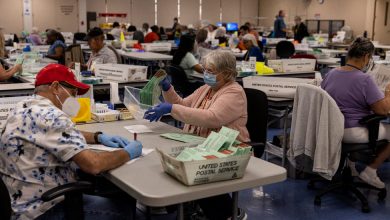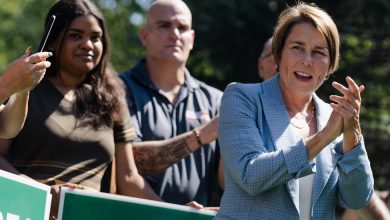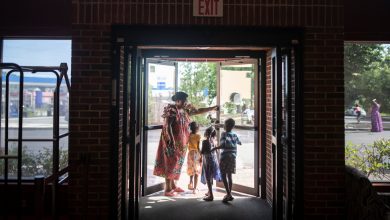How a Murdoch Hopes to Save American Democracy

Over the last decade, as America’s two dominant political parties pulled farther apart, a group of centrist-minded donors was growing increasingly frustrated.
A gridlocked Congress made bipartisan policy wins close to impossible. Campaign-finance reform? The Supreme Court effectively put a stake in it in 2010. Climate legislation? Time and again, it hit a phalanx of Republican opposition.
“Basically, everything that we were looking at would run up against a nonfunctioning government,” said Kathryn Murdoch, who has become a leader of a network of donors seeking to change the way Americans choose their elected officials.
Fix the election system, the thinking goes, and the government will begin to run more smoothly. But when Murdoch’s family foundation, Quadrivium, examined the democracy reform movement, they found it too anemic and fractured to be effective.
“Everything was very subscale, it seemed very clear to me — smart people, good ideas, a lot of data backing all of it up, but subscale for the problem, and not a lot of collaboration or, frankly, enough funds,” Murdoch said in an interview.
The daughter-in-law of Rupert Murdoch, the Australian media mogul, Kathryn Murdoch has often found herself at odds with the conservative politics of her family’s TV, print and radio empire. Murdoch, a registered independent who is American, spent years funding efforts to slow climate change, only to encounter political obstacles at nearly every turn. Her new focus is building a movement to reshape American democracy itself, and she has set a goal of mobilizing $100 million to do so over the 2020 and 2022 election cycles.
This focus has meant pitching her fellow philanthropists on why they should donate to democracy groups rather than to their own causes.
“There’s not necessarily a special-interest group that is helping to ensure the integrity of the system,” said Marc Merrill, a software entrepreneur and donor who works with Murdoch on political overhaul projects. “Well, that’s an opportunity.”
Murdoch’s problem with primaries
Murdoch quickly determined that the chief villain was the partisan primary.
It was aiding extremist candidates like Representative Marjorie Taylor Greene, a Republican of Georgia. It was forcing moderate Republican senators like Susan Collins of Maine and Lisa Murkowski of Alaska to cater to the right wing rather than to the center of the electorate. And it was souring voters on politics. Murdoch has the statistics at her fingertips: In 2020, just 10 percent of Americans effectively elected 83 percent of the House. Only 17 percent of general elections for House seats were competitive.
“What I hear all the time is that there are people who want to work on legislation, but they can’t before their primary, because they are terrified — and particularly if there’s an extreme Trumpy candidate or something like that,” Murdoch said. “They’re terrified of being seen as bipartisan. And that’s absolutely the wrong thing for the American people.”
Murdoch says she now sees a “clear path” to fixing what ails American democracy, even if it takes years. A big part of the solution, in her view, is getting rid of partisan primaries altogether.
On that much, advocates agree — though they may differ on the remedy required.
In addition to Murdoch, several other donors have bankrolled the idea of eliminating partisan primaries. John and Laura Arnold, a billionaire couple from Texas, are big financial backers. So is Mike Novogratz, a Wall Street financier. Katherine Gehl, the former chief executive of a food company and co-author of “The Politics Industry,” a political reform manifesto, is an influential proponent.
“How can we take that weapon away from people using it for those self-interested, narrow purposes?” Laura Arnold asked in a podcast discussion on partisan primaries with Gehl, who is pushing her own alternative called “final-five voting.”
The Trump factor
The biggest factor energizing advocates is Donald Trump, whose attacks on the integrity of the American election system and endorsements of fringe candidates have alarmed many donors.
“After Trump got elected, things started to shift toward structural issues of democracy,” said Lee Drutman, who studies election reform as a senior fellow at the New America Foundation. “And the Jan. 6 riot at the Capitol was a galvanizing moment.”
A separate group, launched by Novogratz, has been enlisting philanthropists to each pledge 1 percent of their net worth toward “protecting democracy” and said it had already raised $87 million toward a goal of $250 million in pledges by 2024.
Most proposed changes include some variation on ranked-choice voting, a system that allows voters to select their preferred candidates in order. New York City used the system in its Democratic primary for mayor last year, to great media fanfare — a breakout moment for what previously had been an obscure cause promoted by a small and scattered group of activists.
Before then, ranked-choice proponents had notched a few quieter wins. In Maine, voters pushed through a ballot initiative in 2016 to become the first state to allow the system in elections for federal office. Alaska followed in 2020 with a similar ballot initiative, and 51 cities across the country have adopted ranked choice in some form or another.
Proponents of ranked-choice voting argue it will make campaigns more civil, save money, lessen the polarization that is poisoning American politics and give voters more choices. And while the data is still out on many of those claims, surveys do show that voters tend to like it.
One detractor has been Sherrie Swensen, the clerk of Salt Lake County, Utah, a state that has embraced ranked-choice voting in municipal elections. Swensen, whose position includes overseeing elections, said the system was “very complex to implement,” as it took weeks to figure out how to design new ballots.
The democracy lobby
Murdoch is plowing resources and much of her energy into Unite America, a collection of groups that backs organizations, campaigns and candidates that support her reform goals. Unite America is meant to be a “cross-partisan” meeting ground for donors and activists, she said. “It’s a group of people,” Murdoch added with a chuckle, “with a wide variety of reasonable opinions.”
Its executive director is Nick Troiano, a 32-year-old activist who ran for office as an independent in Pennsylvania at 24. Troiano has recruited a staff of hard-nosed political operatives from both parties, hoping to develop a cadre of seasoned campaigners who can steer investments and advise ballot initiatives in new states.
“One thing that we’ve learned is we have to professionalize running these campaigns, and some of the best political talent that’s out there is sometimes locked up in the parties,” Troiano said.
Murdoch and Merrill have also invested in Citizen Data, a nonpartisan outfit that provides voter information and analytical tools to groups that don’t have access to the two parties’ vast data resources.
In the short term, Troiano expects what he calls “the primary problem” to get worse before it gets better. He noted that only a few dozen House seats are expected to be competitive this year, according to the Cook Political Report, even though redistricting has shaped up to be more balanced than many expected.
“The important thing is to take on the winner-take-all mind-set in American politics,” said Rob Ritchie, the head of FairVote, a nonpartisan election reform group. Ritchie predicts that between five and 10 states will be using some version of ranked-choice voting for presidential primaries by 2024, along with dozens more cities.
Unite America’s official goals are somewhat more modest: help at least four new states start nonpartisan primaries and ranked choice in federal elections by 2024, using the Alaska model. Along with Alaska, several other states have already been largely “liberated” from partisan primaries, in Troiano’s estimation: California, Louisiana, Nebraska and Washington.
Over the long term, Murdoch says, she is starting to feel more optimistic about American politics.
“When you’re outside of it, it’s very easy to be completely depressed and cynical and say, ‘It can never get fixed. There’s too much money involved. It’s all going to hell in a handbasket,’” Murdoch said. “But from the inside, if you join in and actually start doing it, you realize that we can get it done.”
What to read
-
The war in Ukraine has ushered in a new era of foreign policy, aligning the United States more closely with Europe and re-energizing its leadership role, Michael Crowley and Edward Wong report. Here is our live coverage of Russia’s invasion of Ukraine.
-
Speaker Nancy Pelosi and President Biden are suggesting different midterm slogans, with some vulnerable House Democrats revolting against the name “build back better,” Jonathan Martin reports.
-
American Bridge, the Democratic super PAC, accused Trump of violating campaign-finance law by spending political funds on a 2024 presidential bid without formally declaring himself a candidate, Shane Goldmacher reports.
how they run
Virginia’s ‘silver surge’
Did angry school parents really sway the Virginia governor’s race?
A new analysis by the Democratic-aligned firm TargetSmart suggests that conventional wisdom is wrong.
Drawing on newly available voting records, the firm found that turnout among voters aged 75 or older went up by 59 percent in 2021 compared with the 2017 election for governor.
As for those angry parents, when TargetSmart looked at counties where schools closed because of the coronavirus pandemic, it found no comparable surge for Republicans.
“In fact,” TargetSmart’s Tom Bonier writes, “the biggest swings towards Republicans occurred in southwestern Virginia, where schools were open for in-person instruction for most of the year.”
None of this means Gov. Glenn Youngkin’s focus on “parents’ rights” and critical race theory in schools did not affect his defeat of former Gov. Terry McAuliffe, the Democratic candidate. But it does suggest that we should be skeptical of first impressions.
Thanks for reading. We’ll see you tomorrow.
— Blake & Leah
Is there anything you think we’re missing? Anything you want to see more of? We’d love to hear from you. Email us at [email protected].



